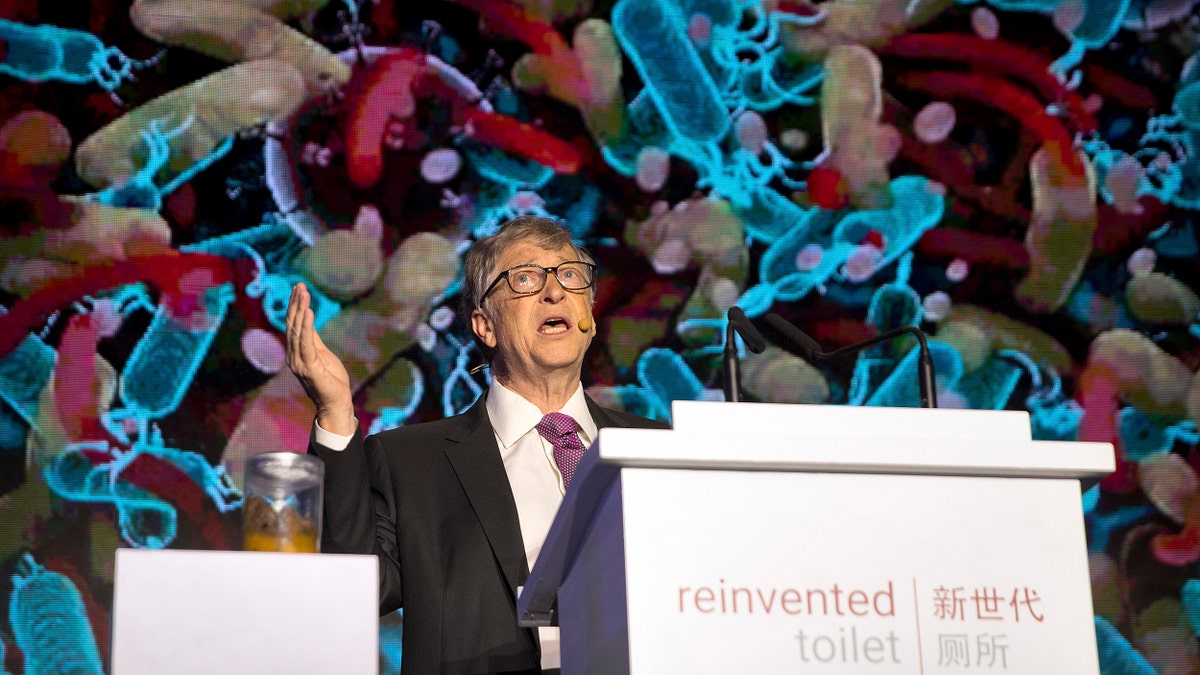
Bill Gates, former Microsoft CEO and co-founder of the Bill and Melinda Gates Foundation, speaks as a jar of human feces sits on a podium at the Reinvented Toilet Expo in Beijing, Tuesday, Nov. 6, 2018. (AP Photo/Mark Schiefelbein)
With a jar of feces on a pedestal next to him, billionaire philanthropist Bill Gates kicked off a “Reinvented Toilet” Expo in China on Tuesday.
The Microsoft co-founder and co-chairman of the Bill and Melinda Gates Foundation made a plea for the safe disposal of human waste during his keynote at the event in Beijing.
"You might guess what's in this beaker — and you'd be right. Human feces," he said. "This small amount of feces could contain as many as 200 trillion rotavirus cells, 20 billion Shigella bacteria, and 100,000 parasitic worm eggs."
BILL GATES DONATES $4M TO CREATE MOSQUITOES THAT KILL EACH OTHER USING SEX
Gates went on to explain that the aforementioned pathogens cause diseases that kill nearly 500,000 children under the age of 5 every year. The former Microsoft CEO left the feces on display for about 10 minutes before removing it, his point made.
The Bill and Melinda Gates Foundation that Gates co-founded with his wife has spent more than $200 million since 2011 to stimulate research and development of safe sanitation technology.
FOX ON TECH: MICROSOFT’S BIG ANNOUNCEMENT
“There are few things I love talking about more than toilets,” Gates tweeted Monday with a video that described his Foundation’s work to improve sanitation for the world’s poorest people. In particular, the organization is working to find ways to process waste in areas that do not have the infrastructure to remove it.
“Some scientists that I work with said that we should challenge the world to come up with a way of taking the waste and processing it locally,” he explained, in the video.
The Foundation is already testing a number of these “reinvented toilets” in Durban, South Africa.
“Durban is a good place to run these tests because the city is growing fast and many people there don’t have a modern sanitation, which means that, even if they have access to a toilet, the waste can get into the environment and make people sick,” he said. “A typical toilet needs water, but many of the new approaches don’t require any water at all, some of them don’t need electricity either, others run on solar power.”
MICROSOFT CALLS FOR FACIAL RECOGNITION TECHNOLOGY RULES GIVEN 'POTENTIAL FOR ABUSE'
“All of them remove the pathogens from the waste and, most importantly, they don’t have to be connected to the sewer system,” Gates added. “I am optimistic that eventually, we will find approaches that make great sanitation available to everyone.”
UNICEF estimates that 4.5 billion people worldwide do not have access to safely managed sanitation and that 480,000 children under 5 die every year from diarrhea, primarily in South Asia and sub-Saharan Africa. Additionally, poor sanitation cost the world nearly $223 billion in 2015, according to a study by Oxford Economics and Japanese toilet maker Lixil.
More than 20 companies and academic institutions are exhibiting new toilet technologies at the three-day expo in Beijing, from self-contained toilets to a small-scale, self-powered waste treatment plant called the Omni Processor.
The Associated Press contributed to this article. Follow James Rogers on Twitter @jamesjrogers




















